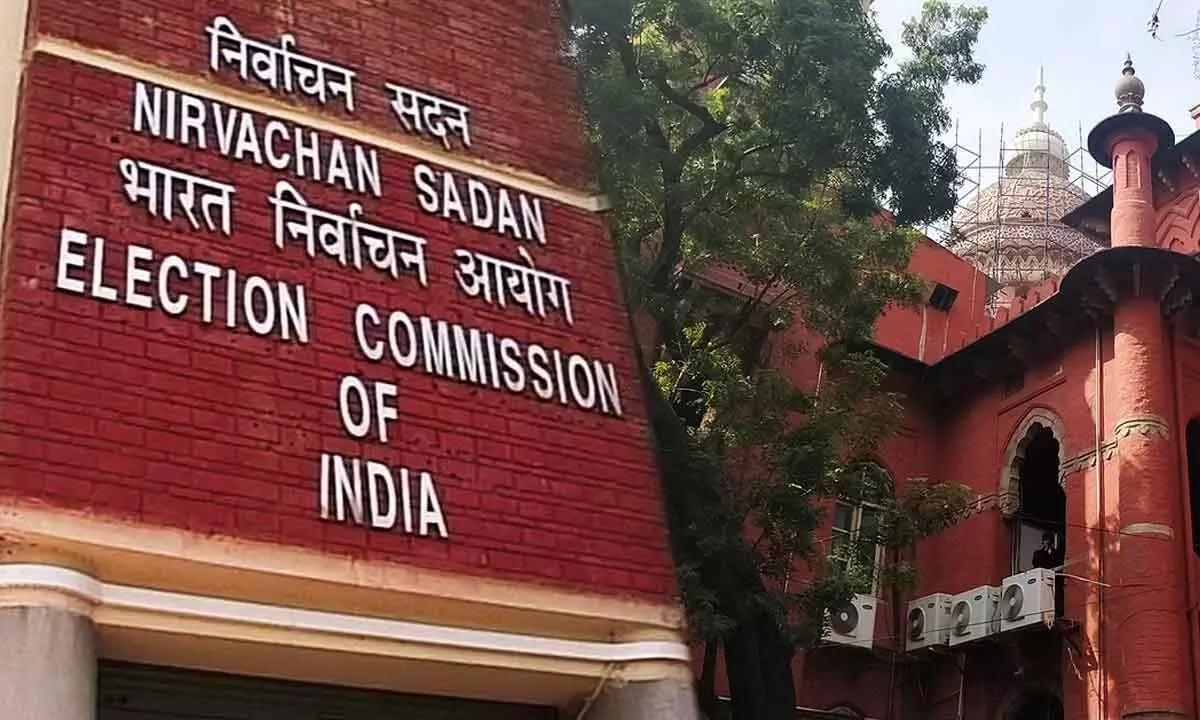Live
- Sansad Sangram Begins: Oppn stalls Parl over Adani issue, Manipur
- Stern action against social media abusers, warns minister
- Dr Karri Rama Reddy sets record by securing 50 degrees
- Mohini Bhasmasura dance ballet captivates audience
- Film director Ram Gopal Varma evades police questioning
- MyVoice: Views of our readers 26th November 2024
- MoU signed to implement NeVA project in AP Assembly
- Climate Change: Trump 2.0 Is Not A Fluke
- Disinformation & Disempowerment: How women’s basic rights and freedoms are being eroded all over the world
- Mahila Meekosam launched for protection of students, women
Just In
EC move on poll promises not within its remit


Election Commission of India
The Election Commission of India has asked political parties to provide detailed information about the financial implications of the promises made in their election manifestos as well as the effects of these promises on the fiscal sustainability of the State or central government's finances.
The Election Commission of India has asked political parties to provide detailed information about the financial implications of the promises made in their election manifestos as well as the effects of these promises on the fiscal sustainability of the State or central government's finances. To this effect, it proposes to amend the model code of conduct to include a two-part pro forma to be filled up by political parties for disclosure of the promises made and the financial implications of these.
Seriously? Doesn't it sound a bit bizarre? The ECI justified its position thus: "While the Commission is agnostic to the nature of promises, the need to frame disclosure requirements to enable healthy debate on the financial implications of implementing those promises both in the immediate future and for the long-term fiscal sustainability is imperative for facilitating the conduct of free and fair elections." The discussion on the 'revadi culture' started off with the Prime Minister, Narendra Modi, speaking on the issue sometime back while attacking the opposition for their offer of 'freebies' to voters. In a democracy like ours, offering freebies and lures is nothing new. For that matter every political party offers some kind of incentive to the voters to attract them to their fold.
But for the ECI to ask the political parties to explain how their promises would be implemented and its impact on the economy is easier said than done. Is it possible for the politicians or parties to do the math-work here beforehand? Even after coming to power, they have to depend on financial experts to design their programme. That is the reason why all political parties cannot implement most of their major promises. In case of issues like reservations – even here irrational percentages are on the offer to certain segments of voters – the parties that come to power could always escape the constraints of accountability by citing legal obstructions.
The ECI clarified that it would then study the impact of the promises on fiscal sustainability. Is it the duty of the Election Commission to monitor fiscal resources of States or check the fiscal sustainability of government policies? For that matter, what is the expertise of the ECI to match the promises with performances and then arrive at conclusions regarding the financial health of the governments and states? The ECI should recall the contents of its own affidavit to the SC in the related matter wherein it said: "promises made in a manifesto are not enforceable under election law." It further stated that it is not within its powers to stop them from making such promises. The EC's affidavit referred to the SC's 2013 ruling in the S Subramaniam Balaji vs Government of Tamil Nadu and others case, wherein it was said that a promise contained in an election manifesto cannot in itself constitute a bribe or corrupt practice as per Section 123 of the Representation of People's Act, 1951.
The ECI's intervention on the financial implications of election promises made by political parties will be a serious infringement on the right of political parties to address people's vital concerns and to respond to them in a democratic fashion. All political parties must be one in opposing this move of the Election Commission.

© 2024 Hyderabad Media House Limited/The Hans India. All rights reserved. Powered by hocalwire.com






